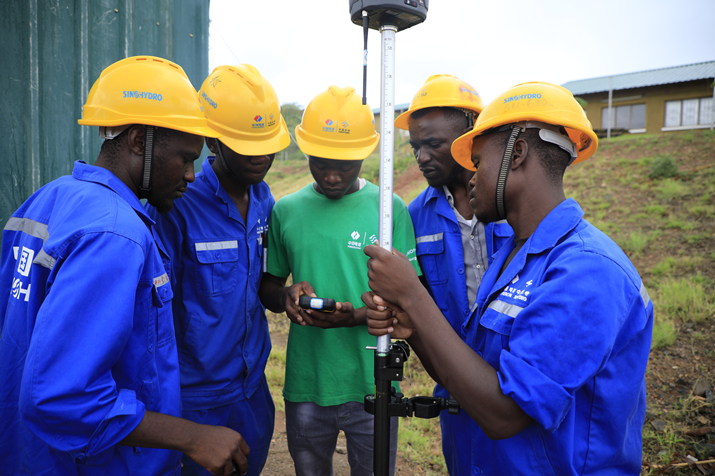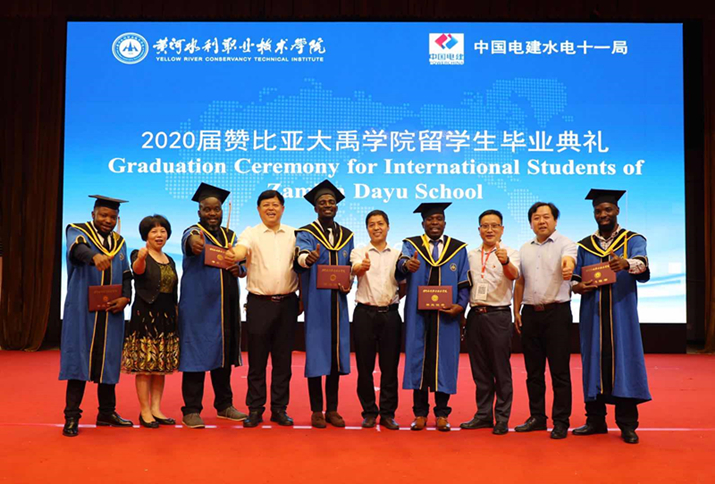|
||||||||||
| Home Nation World Business Opinion Lifestyle ChinAfrica Multimedia Columnists Documents Special Reports |
|
||||||||||
| Home Nation World Business Opinion Lifestyle ChinAfrica Multimedia Columnists Documents Special Reports |
| ChinAfrica |
| A Powerful Contribution |
| Chinese engineering giant supports cultivation of highly skilled talent in Zambia |
| By Xia Yuanyuan 丨VOL. 15 January 2023 ·2023-01-09 |

On the Kafue River about 90 km south of Zambian capital Lusaka, Zambia’s first large-scale hydropower station is humming smoothly.
Commissioned in July 2021, the Kafue Gorge Lower Hydropower Station, constructed by Power Construction Corp of China (PowerChina), China’s hydropower engineering and construction company, plans to install five Francis turbines, with a total installed capacity of 750 mw. When the five generating units go into full operation, the country’s power supply will rise by 38 percent.
Not only has the plant accelerated the industrialisation process of Zambia, it has also changed the fate of many young people in Zambia. Gift Kapanda is one of them.
In 2017, life took an incredible turn for the 35-year-old young Zambian when he visited the Sinohydro Training Institute, which was launched by PowerChina the same year. It offers free vocational training courses to train skilled workers for the hydropower project and generate talents for local projects in Zambia.
Kapanda was enrolled in the institute and studied electrical engineering and started his “transformation.”
Like Kapanda, the fate of more than 300 young people in Zambia has completely changed by the Sinohydro Training Institute. The skills they gained at the institute have transformed their lives.
Since entering the Zambian market in 2001, PowerChina has been deeply involved in the country’s development. “By cultivating and employing local people, it is possible to strengthen the exchanges between the Chinese and African people, so as to better bring our hearts closer,” said Song Mingming, country representative of PowerChina in Zambia.
Building careers
With an investment of $1.45 million, the Sinohydro Training Institute was established by PowerChina in Chikankata, a district 90 km southwest of capital city Lusaka. In 2017, the institute was unveiled by Zambian President Edgar Lungu.
The institute recruits students from all over Zambia, providing free education and training, free accommodation, and living allowances, with the aim of cultivating urgently needed skilled talents in the field of infrastructure construction for Zambia.
Lungu said the institute will be a major asset as his government develops more and more hydropower stations. He believes that the skills gained by local workers in the institute will not only be used for future power plant projects but also for their own development.
So far, the institute has trained 332 students, including 10 women as technicians, who have become the backbone of this project as well as other engineering construction projects in Zambia. Most of them work for the power project after they complete training, Fang Zhi, dean of the institute, told ChinAfrica. “The technical training institute not only fosters skilled personnel needed for the project, but also trains the much-needed engineering personnel for Zambia.”
In 2019, Kapanda and another four excellent graduates got scholarships to study in the Yellow River Conservancy Technical Institute in central China’s Henan Province. Now working as an electrical engineer at the Kafue Gorge Lower Hydropower Station, Kapanda says he is living a successful and fulfilling life that a person like him could never dream of.
“I used to be an ordinary electrician who could only do some simple wiring or repairs, but it is different now. I have received professional and systematic training. With practice, I have become a good electrical engineer,” Kapanda told ChinAfrica.

Transforming workers’ lives
China’s aid to Africa has been falsely accused by some Western countries as “neo-colonialism,” and the image of Chinese companies in Africa has also been viciously distorted and vilified by some Western media. Zhou Qingguo, project manager of the Kafue Gorge Lower Hydropower Station Bureau, said that localised management, job creation, skills training and other benefits are a powerful response to unfounded accusations.
“The fact is that Chinese enterprises in Africa employ a large number of local workers through the localisation of human resources, which greatly promotes local employment, improves the living standards of local people, and enhances the sense of belonging, happiness and responsibility of local employees,” Zhou told ChinAfrica.
Since the Kafue Gorge Lower Hydropower Station came into operation, more than 10,000 local employees have been employed, accounting for 90 percent of the power project’s workforce. There are more than 60 Zambian senior managers who are playing important roles in various departments such as public relations, customs clearance, procurement, human resource management, and legal affairs.
Kapanda’s life changed dramatically after he joined the Kaifu Gorge Lower Hydropower Station. Currently, his monthly income reaches around $400, which is much higher than the local average income of around $100. The average salary of local employees at the hydropower station can reach $300, according to Zhou.
“My salary has raised the living standard of our whole family. We have newly added sofas and TV sets at home, and my daughter can afford beautiful dresses,” Kapanda said.
In his view, PowerChina has transformed his life, and the skills he has mastered in Chinese companies will benefit him for the entire life. “I know that PowerChina has been rooted in Zambia for more than 20 years. If there is an opportunity, I am willing to use my 20 years to repay it,” he said.
People-to-people bond is an important content of the Vision and Actions on Jointly Building Silk Road Economic Belt and 21st-Century Maritime Silk Road issued by the Chinese government in 2015. Song said that the Chinese-funded enterprises can strengthen the relationship between China and Africa by hiring local employees. The solidarity and communication among the people at work and the people-to-people and cultural exchanges are important tools for building bonds.
| About Us | Contact Us | Advertise with Us | Subscribe |
| Copyright Beijing Review All rights reserved 京ICP备08005356号-5 京公网安备110102005860号 |